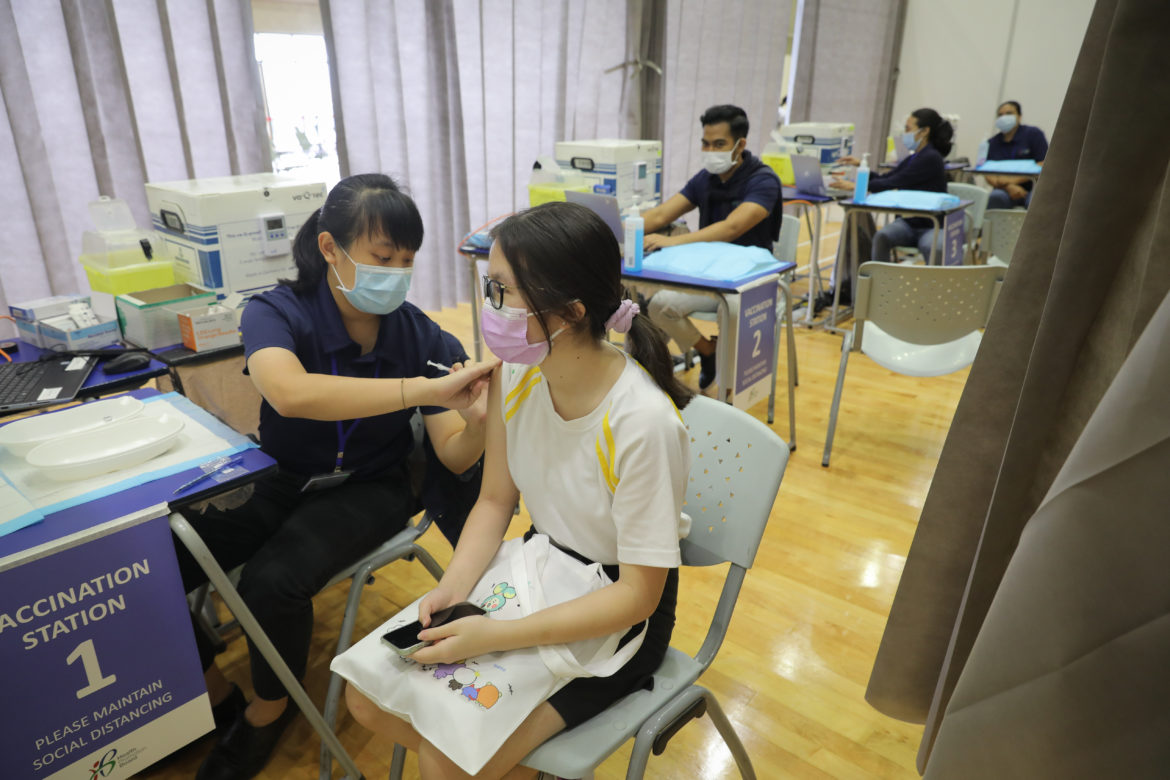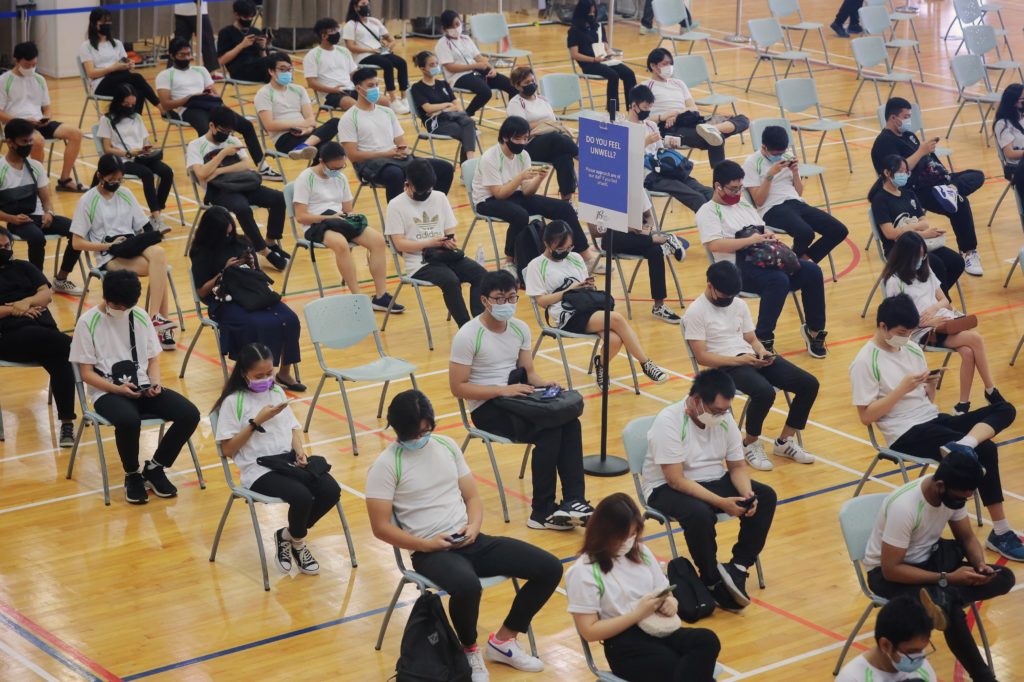Although fewer children have been sick with Covid-19 than adults, they can develop long-term health problems from Covid-19 complications, especially for those with underlying medical conditions.
Getting children of eligible age (12 to 17 years) vaccinated helps protect them from infection, and reduces the likelihood of transmitting the disease to other family members, especially to those who are more vulnerable, such as elderly relatives or people with weakened immune systems.
Being vaccinated may also give parents and children peace of mind to return to more typical activities like in-person schooling and extracurricular activities. From June 1, more than 400,000 students were progressively invited to register for vaccinations after the Pfizer-BioNTech vaccine was approved in May by the Health Sciences Authority (HSA) for those aged 12 to 15 years.
The Ministry of Health (MOH) first sent out the invites to students or parents of students in graduating cohorts from secondary schools and pre-university levels such as those sitting for GCE N-, O- or A-level examinations later this year.
There is no evidence that the mRNA-based Covid-19 vaccine can cause infertility in child recipients. It also does not enter or change the DNA of our body cells. While there were reports of young people who developed myocarditis (heart muscle inflammation) or pericarditis (inflammation of the saclike tissue surrounding the heart), such occurrences in Israel and the United States were not significantly higher among vaccinated children compared to those who are not vaccinated. In addition, most patients with these conditions recovered fast and responded well to medicine and rest.
According to HSA, there were 12 reports of people with myocarditis and pericarditis following their vaccination in Singapore as of June 30. Five of the cases occurred in adults aged 30 years old and above. Seven involved males below 30. There was also a recent case of a 16-year-old boy who suffered a cardiac arrest shortly after he embarked on a strenuous weightlifting session six days after receiving his first dose of the mRNA Covid-19 vaccine. Therefore, those who have been vaccinated, particularly adolescents and men under 30, should avoid exercise or strenuous physical activity for a week after any dose of the jab. The boy has since fully recovered.
Sinovac vaccination
Meanwhile, those who wish to receive the Sinovac vaccine due to allergies to mRNA-based vaccines or certain medical conditions should discuss their suitability with their doctor before going for the jab. To date, 31 private healthcare clinics offer the Sinovac vaccine. The fee for administering one dose at these clinics ranges from $20 to $25, which covers consultation cost, administration and tax.
As of August 7, 130,952 doses of Sinovac vaccines have been administered, covering 81,612 individuals, according to MOH.
Those who have received one dose of an mRNA Covid-19 vaccine but cannot receive the second dose due to allergic reactions have been invited to take the Sinovac vaccine. Those individuals who complete the vaccination process with Sinovac will be considered fully vaccinated.
MOH plans to bring in other non-mRNA vaccines before the end of the year, and more details will be announced later.
Quarantine order
If you are issued a quarantine order and live with household members who are not given one, you will need to serve your order at a government quarantine facility. However, you may be allowed to serve quarantine at home under exceptional circumstances, such as your requiring a caregiver or you being fully vaccinated or under 19 years old.
MOH also said that someone is considered “fully vaccinated” two weeks after receiving a complete regimen of the Pfizer-BioNTech/Comirnatry or Moderna vaccine. The full vaccination status includes other vaccines under the World Health Organization’s Emergency Use Listing, including Sinovac, Sinopharm, Johnson & Johnson, Covishield and AstraZeneca Covid-19 vaccines.
Those serving Home Quarantine Order (HQO) are required to take a mandatory exit Polymerase Chain Reaction (PCR) test one to two days before the quarantine end date and produce a negative result. They will also need to perform a self-administered Antigen Rapid Test (ART) one day before the exit PCR test appointment.
Those living in the same home as a person under home quarantine will have to sign a Letter of Undertaking or a Stay Order and will not be allowed to leave the house. Household members of those serving HQO will have to undergo an ART on days three, five, seven and 14 of the quarantine period.
Easing of Covid-19 restrictions
As more people get their Covid-19 jabs, Singapore has taken its next steps towards resuming more business and social activities from August 10.
- Groups of up to five people will be allowed to dine at food and beverage establishments if all diners are fully vaccinated. Exceptions will be made for unvaccinated children aged 12 and below, who may be included in the group of five as long as all are from the same household.
- People may dine at hawker centres and coffee shops in groups of two regardless of their vaccination status.
- Social gatherings in groups of five are allowed. However, unvaccinated people are encouraged to stay in groups of two.
- Each household can receive up to five visitors per day. However, social gatherings should be capped at two unique visits per day.
- Up to 500 worshippers may attend religious services if all are vaccinated. However, this limit is reduced to 50 if any are unvaccinated. Exceptions will be made for unvaccinated children 12 and below, who may not make up more than one-fifth of the total congregation size. In addition, if congregants gather in groups of up to five, any child in the group must be from the same household.
- There can be up to 30 attendees at funerals.
- Up to 500 people can attend live performances if they are all vaccinated. However, if some attendees are unvaccinated and there is no pre-event testing, the cap is reduced to 50. Exceptions will be made for unvaccinated children 12 and below who may not make up more than one-fifth of the event size. If people gather in groups of up to five during the performance, any unvaccinated child in the group aged 12 and below must be from the same household.
- In-person tuition and enrichment classes of up to 50 people are allowed. However, those attending such classes are still strongly encouraged to do so virtually.
- Indoor mask-off high-intensity activities are capped at 30 people in groups of up to five if all individuals are vaccinated.
- Indoor mask-on activities and all outdoor activities are capped at 50 people in groups of up to five, regardless of vaccination status.
- Up to 500 people may attend meetings, incentives, conventions and exhibitions (MICE events) if they have all been vaccinated. If not, this limit is reduced to 50.
- Up to 1000 people may attend wedding solemnisation if they have all been vaccinated or have undergone pre-event testing. Group sizes should be kept to a maximum of 5 persons. Without pre-event testing, this limit is reduced to 50. Unvaccinated children 12 and below may attend but may not make up more than 20 per cent of the event size.
- Up to 250 people may attend wedding receptions if they are all vaccinated. Group sizes will be capped at five attendees per table.
- Up to 50 per cent of employees who can work from home may return to the workplace. Workplace social gatherings will also be allowed.
- Up to 1,000 worshippers may attend congregational and worship services if all are vaccinated. However, this limit is reduced to 50 worshippers if some are unvaccinated.
- The attendance of a live performance will be increased to 1,000 attendees if all in the audience are fully vaccinated. However, it will remain at 50 if some attendees are unvaccinated and there is no pre-event testing.
Free surgical and N95 masks for every Singapore household
As the Delta variant is twice as contagious as the other variants that caused Covid-19 last year, all Singapore residents will need to wear more effective masks to curb the spread of the virus. Temasek Foundation will be distributing free surgical and N95 masks to every household as part of the upcoming Stay Prepared exercise.
Explaining the reason for medical-grade surgical masks, Temasek Chief Executive Officer Ms Ho Ching said in a Facebook post that these masks had 95% filtration efficiency or better. She added that N95 masks are worn for high-risk jobs such as looking after Covid-19 patients or doing mass swabbing exercises.
Each household will be able to redeem 50 medical-grade surgical masks and 25 N95 respirator masks from August 26 to September 26. They will need to produce their Singapore Power (SP) resident bill or account number for the redemption or scan the SP bill barcode via the SP app.
Redemptions will be available at participating CapitaLand malls and selected Sheng Siong, Prime, Cold Storage, FairPrice Xtra and Giant supermarket outlets. Residents are reminded to bring their own bags to carry the free masks.
What type of masks to use?
Those with flu-like symptoms should wear a medical-grade surgical mask when they visit a doctor, while those who have tested positive with an ART kit should wear an N95 mask to see a doctor.
Vaccinated visitors to hospitals or nursing homes should wear a medical-grade surgical mask, while those who are unvaccinated should wear an N95 mask.
Proper storage of masks
As high humidity can affect the effectiveness of a mask, it should be stored under dry and airtight conditions away from direct sunlight.
For more information, call the Temasek Foundation hotline at 1800-738-2000 (from 9am to 9pm daily, excluding public holidays).
*Source: Ministry of Health




